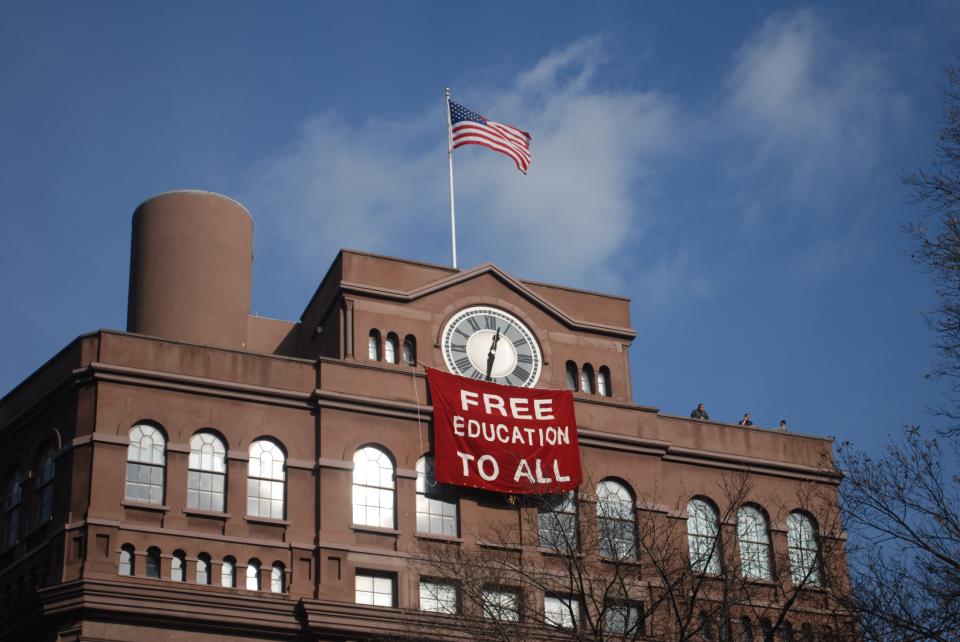Art World
Cooper Union Submits to Financial Monitoring on Path Back to Full-Tuition Scholarships
The school is accused of plagiarism and conflict of interest.

The school is accused of plagiarism and conflict of interest.

Brian Boucher

An epic conflict at a New York college has reached a new phase, marked by an agreement with the state attorney general that reportedly includes a stinging assessment of the school’s conduct.
After a yearlong investigation by Eric Schneiderman, the New York attorney general, the Cooper Union will resolve a lawsuit brought by a group of students and alumni. The lawsuit stemmed from the college’s 2013 move to end full-tuition scholarships after over a century of free study for all, which gave rise to a movement by students and alumni to find a way to restore the school to a sound financial footing while preserving a free education.
Filed by the Committee to Save Cooper Union (CSCU), a group of students and alumni, the lawsuit alleged financial mismanagement, extravagant spending, and “improper self-dealing.” The school will submit to financial monitoring by the attorney general, though the agreement, signed by Scheiderman, the school and CSCU, stipulates that Cooper admits no wrongdoing.
The school began to charge tuition of freshmen in 2014, having announced in 2013 that it would charge up to $19,500, which it said represented 50 percent of full tuition.

Students hang banner below the historic clock tower of the Cooper Union Foundation building in New York City during a December 2012 occupation in protest of the possibility of implementing tuition in the historically free school. Photo by Free Cooper Union, Creative Commons Attribution-Share Alike 3.0 Unported license.
The move led not only to a lawsuit but to a nine-week occupation of the office of president Jamshed Bharucha by disgruntled students.
Key to the suit was the school’s construction of a $167-million new academic building, designed by Los Angeles architect Thom Mayne, completed in 2009. The school counted on paying for the building partly by its investments. This plan was foiled by the 2008-2009 stock market crash, where the money was lost. However, the school maintained in the press that it was largely unaffected by the global financial downturn.
But then when president Bharucha took office in 2011, he revealed that the school had been operating at a deficit for decades, and said that the school might have to begin charging tuition. Bharucha resigned in June of this year, followed by the abrupt departure of five trustees who supported charging tuition.
The attorney general “plans to file a court petition on Wednesday that includes a scathing rebuke to the board and Mr. Bharucha,” according to the Wall Street Journal.
That petition will claim that a committee formed to explore alternatives to tuition was “denied access to information,” while the school itself “[communicated] inaccurate information” to the school community. Bharucha and members of the board refuted these claims in interviews with the Journal.
Schneiderman’s petition also points to an “apparent conflict of interest” in a bonus awarded to Bharucha’s predecessor, George Campbell Jr., which was contingent on construction of the new building, according to the Journal. The petition goes on to note that the school plagiarized course descriptions for a computer science program that it attempted to register with the state while revealing that the school’s own engineering school had rejected it.
Representatives of the board call these assessments “incorrect and incomplete.”
As part of the deal, pending approval by the courts, the institution, which includes schools of art, architecture, and engineering, will continue to charge some students tuition based on a sliding scale, while a committee will seek a way to return to a full-tuition scholarship for all.
The consent agreement also dictates that the board of trustees will include two students with voting rights as well as several members elected by graduates (between five and nine depending on the size of the board).
Peter Cooper, the industrialist who founded the school in 1859, did so based on the belief that education should be “as free as air and water.” The “Free Education Committee,” composed of students and alumni, will present a plan in January 2018 to reinstitute full scholarships. The attorney general’s monitor will weigh in on the plan.